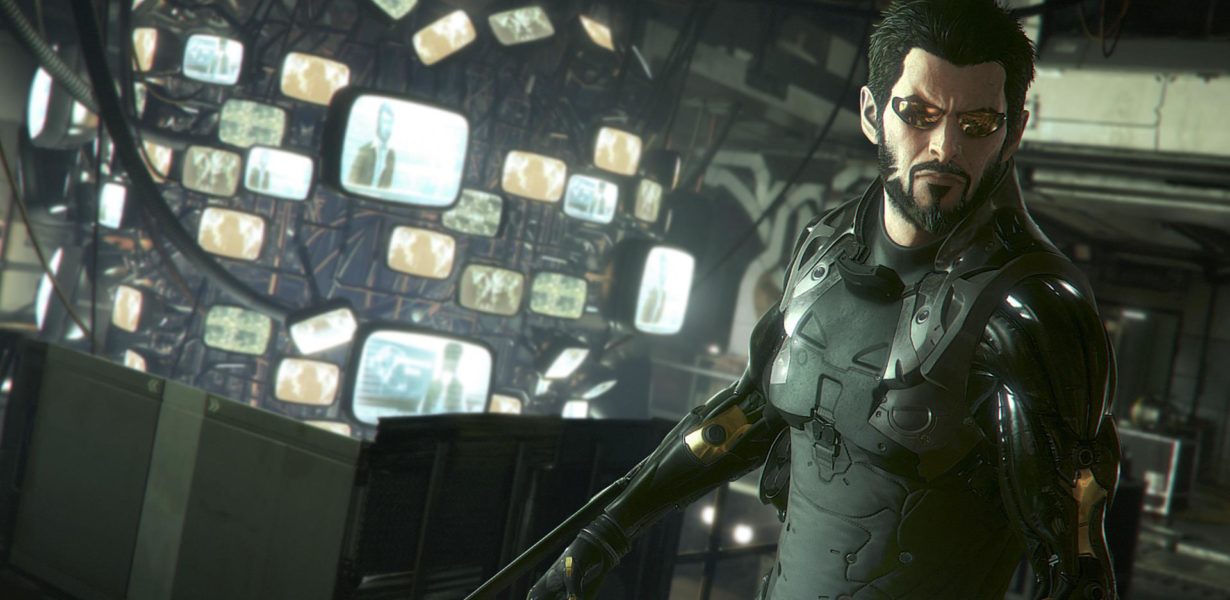Mankind Divided takes place two years after the events of Human Revolution, and if you weren’t a fan of the color yellow, you’ll be pleased to know that the sequel offers up a wide palette of colors with each environment it puts you in.
Everything in Deus Ex: Mankind Divided looks so much brighter and livelier it’s hard not to just stop every now and then, and take in the beautiful sights of Prague. But of course, that beautiful scenery is just a mask for the civil unrest that bubbles underneath.
Two years after the Aug Incident, the ‘natural’ humans of the world now live in fear of the ‘Augs.’ Mankind experiences a literal division (ha), a segregation where the Augs are actively oppressed as the fearful natural humans seek to throw them out of civilization. Players take control of Adam Jensen, an ex-cop from Detroit who’s now part of a new Interpol branch, tasked with tracking down an Aug terrorist group that’s trying to fight back against the oppression.
Whereas Human Revolution started you off in the chill city of Detroit, Mankind Divided’s Prague is noticeably more sinister. You won’t be actively harassed on the streets, but you will see NPCs milling about, along with Augs getting shot and interrogated by the local police force. Mankind Divided might be a more colorful and cheery-looking game, but the tones here are certainly darker and very grim.
Mankind Divided offers players an open world filled with side missions that you can take up, and these will give you more insight into the political and social mindsets of the Augs and naturals alike. With the large rift that’s grown within humanity, this is the perfect setup for a rather well-realized sense of decisions and consequences that come with every action you make.

Throughout the course of the game, Jensen will have to make tough decisions. One of the earlier side missions I took on involved me trying to help two Augs obtain ID passes so they wouldn’t get thrown out of the city. To do this, an Aug forger provided me with two plastic cards, and I had to take them to the town registry and enter them into the system. However, when I snuck into the office, I quickly realized that there was a quota for the number of registrants allowed, and I could only obtain a pass for one of them.
Do I give the pass to the old man who just wants to have a normal life with his daughter again? Or do I give it to the lonely young woman who sits in her basement all day, paralyzed by the thought that the police could come knocking any minute?
That’s just one of the tamer decisions I had to make in Deus Ex: Mankind Divided, and you can rest assured knowing that there are quite a number of moral dilemmas that await you in the game.
Mankind Divided’s gameplay remains largely the same; you take control of Jensen in first-person mode, but the game quickly snaps to a third-person view whenever you get into cover. Stealth takedowns are still as satisfying as ever, and the takedown animations are crisp here. You could technically play the entire game as a shooter, but the real fun comes in experimenting with Jensen’s augmentations.
Early on in the game, Mankind Divided throws players for a loop and reveals that Jensen actually has a bunch of untested, experimental augmentations within his system. They’re a lot more powerful than what we’re used to, but these come with a caveat – activating high power augmentations will cause Jensen’s system to overload and destabilize, and you’ll have to balance him out again by deactivating one of your other augmentations. And yes, these changes are permanent. Though I did eventually discover a way to use my augmentations with no limitations, having to balance out Jensen’s system was a neat way of keeping the player on their toes.

Locking out the wrong augmentations early on could make things very difficult for you, and having to give serious thought to which abilities I needed more than others was thoroughly welcome.
While it can be a lot of fun taking out enemies with Jensen’s badass nanoblade, unfortunately, the enemy AI in Mankind Divided seems woefully lacking. These enemy troops certainly aren’t as near-sighted as the ones you’ll encounter in a Metal Gear game, but I’ve found that the enemies don’t seem to react to you as quickly as they should. Many times, I would get spotted, and instead of taking the time to find a safe place to hide and wait for things to blow over, it was often easier to just make a beeline for my target area. Because enemies were slow to fire, I could usually hit the next checkpoint by sprinting in exchange for taking a bit of damage. This makes some of the game’s longer levels a breeze to get through, but at the same time, I’m pretty sure this isn’t how a stealth game is meant to be experienced.
Outside of combat, you’ll spend a lot of your time moving from checkpoint to checkpoint. While the environments look absolutely breathtaking in Mankind Divided, certain level design choices are a little questionable. There was one area in the game that required me to get past a column of deadly beams that would trigger lethal explosives if I even touched them. The breaker was on the other side of the room, and the only way to get past the beams was to crawl through a small hole in a fence. However, the hole was blocked off by a heavy object that could only be moved if you purchased a strength upgrade augmentation for Jensen. Thankfully, I had spare Praxis points that I could spend on getting the upgrade. But what if I didn’t have those points? Would I just have been stranded then?
The levels of Deus Ex: Mankind Divided are large and sprawling, but you’ll often find yourself lost because the design simply isn’t intuitive enough to show you the logical path of progression. Encouraging exploration is always a good thing in video games, but not when the majority of said ‘exploration’ becomes a game of hide-and-seek between the player and the elusive alternate path of entry. And certainly not when the path of entry requires you to spend an upgrade point in order to get through.

Strangely enough, the conversations and decision-making processes were by far the best part about Mankind Divided. At key points, the game will force you into a conversation with certain NPCs where you’ll have to make a deal or negotiate with them as you try to make them see things your way. The situation can go south very quickly, but my most satisfying moments with this 25-hour long journey came from my ability to resolve conflicts in a peaceful and non-violent manner.
That said, players shouldn’t go into this game expecting relatable characters and compelling story threads. Mankind Divided does an excellent job of world-building and illustrating the themes of fear and oppression, but the story itself is largely forgettable, and its characters (excluding Jensen) even more so. You’ll spend most of the game not knowing who your primary antagonist is, and when you do finally get a showdown with a boss, there’s no sense of excitement because you simply didn’t have enough time to get to know your adversary.
I get that Jensen’s supposed to be uncovering a conspiracy that could possibly go all the way up to the top (gasp), but rebelling against a faceless corporate entity for 80% of the game just isn’t all that compelling when you don’t have a constant antagonistic presence there to egg you on.
Deus Ex: Mankind Divided is a stellar stealth first-person RPG, and Eidos Montreal has done a wonderful job of placing players in an immersive world that’s been plagued by Aug terrorism and fear. Aside from a few crashes at startup with the PC version, Mankind Divided is very much an enjoyable role-playing experience. The game’s characters aren’t all that memorable, and chances are, you won’t even remember their names after you’re done with your journey, but hey, at least playing around with the augmentations is cool.


There are no comments.